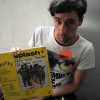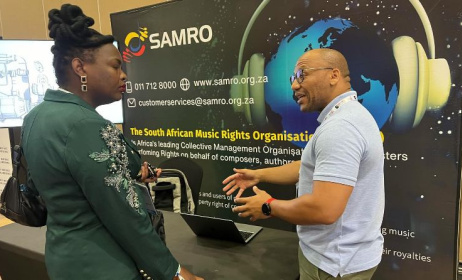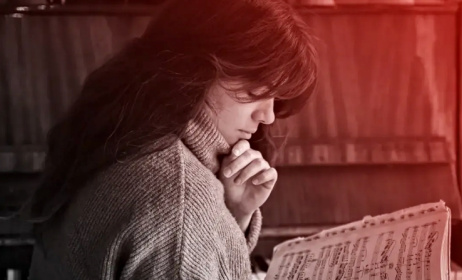90% local music for SABC radio: key talking points
Following ongoing protests by South African musicians against the lack of local music played on radio and TV, the South African Broadcasting Corporation (SABC) this week announced that local music will now make up 90% of its playlist on all 18 of its radio stations - with immediate effect.
 SABC COO Hlaudi Motsoeneng has announced drastic changes to local airplay quotas. Photo: teeveetee.blogspot.co.za
SABC COO Hlaudi Motsoeneng has announced drastic changes to local airplay quotas. Photo: teeveetee.blogspot.co.za All smiles: Don Laka shakes hands with SABC COO Hlaudi Motsoeneng. Photo: Facebook
All smiles: Don Laka shakes hands with SABC COO Hlaudi Motsoeneng. Photo: Facebook
Although an ongoing issue since the early 1990s, the call from musicians for more local music on the airwaves has mounted since February this year under the leadership of veteran musician and producer Don Laka, whose fiery social media rants have exposed how the longstanding preference for American music has resulted in a loss of income and jobs in the music industry, with the country’s collecting agency SAMRO sending much of its royalty payments to artists outside the country.
In late March, the Independent Communications Authority of South Africa (ICASA) that regulates the local media industry raised the existing quotas from 25% to 35% for commercial stations, and from 40% to 60% on community stations. The amended quotas fell short, however, of the 70% quota that advocates were pushing for – and were to be implemented over 18 months rather than immediately. The measure did little to appease Laka and his supporters, who took on the title of ‘SA Music Movement', using the motto “my country, my music”.
Their mission continued to gather momentum. At the end of April, Laka and his legal team met again with ICASA representatives, and on 29 April Laka was invited to speak at the University of Limpopo to further share his message. Around this time SABC Chief Operating Officer Hlaudi Motsoeneng announced that the SABC would be launching new TV channels to promote content production in local languages, promising that musically they would pay more attention to key genres such as jazz and reggae.
‘Radical decision’
On Wednesday 12 May, the SABC announced that following “extensive engagements with music representatives”, they had decided to implement a 90% quota of local music across its 18 radio stations, with immediate effect. SABC boss Hlaudi Motsoeneng stated: “The SABC has taken a radical decision about its local content offering across all its radio, television and digital platforms. It is in this context that the decision on local music will ensure that the SABC fully reflects the various styles of local music on offer."
SABC spokesman Kaizer Kganyago explained further: “The music to be played will be across all genres, with a special focus on genres such as kwaito, jazz, reggae and gospel. In addition, the SABC will play more music from legends in the industry as well as up-and-coming artists.”
Unlike during the apartheid era when the SABC’s radio stations could only broadcast music in the language of the specific group that the station catered for, with any mixing of languages prohibited, Motsoeneng further explained that: “Our respective radio stations will not be confined to playing local music which is language specific. We want to come to a point where any of our 18 radio stations can become a home for all South Africans. This cross-pollination of music is very important.”
On television, the SABC will use local music fillers between programmes, another drastic departure from the prevailing trend. As from 1 July 2016, the SABC has pledged to increase its local content offering on television even more.
Reiterating its commitment to fairness and transparency, the SABC also noted concerns raised around issues of bias and favouritism (in the selection of local content to be played) and promised to “deal with such matters firmly”. The SABC further promised to engage with its audiences to evaluate whether they are satisfied with the new changes, in line with its mission to serve the South African public.
Decision welcomed by Laka and other musicians
The man who has led the call for change, Don Laka, was understandably ecstatic at the news. “Thanks to everyone who supported this,” he wrote on Facebook. “I am very emotional at this stage. Thanks Bra Kaizer and Hlaudi, a bold leader who listened to my emotional plea to save our arts. This man shares the same vision as me. The people of SA: this is a chance to pride yourselves with your own culture!”
Posting a photo of him shaking hands with Motsoeneng, Laka continued: “Today I am proud to be a South African. This man Hlaudi made me shed a tear for the first time in many years…. Freedom at last!“
Laka referred to the move as an “historic moment” and one that marks “the death of cultural imperialism” in the country.
Other members of South Africa’s music fraternity also took to social media to celebrate. One of the elder statesmen of SA music, Sipho ‘Hotstix’ Mabuse wrote: “In my 50th year in music business, SABC to play 90% local music … on 18 radio stations - good news, viva SA music!”
Globe-trotting house producer Black Coffee wrote: “Thanks to the powers that be and thank you Don Laka sir for your contribution.”
R&B singer Danny K expressed his surprise: “Never in my lifetime did I ever think I'd see this - 90%!”
Talking points
While the news seems to be just what the doctor ordered, some questions remain:
- How long will it last?
With the SABC promising to engage with audiences regarding the change, there remains some degree of uncertainty as to whether the change will indeed be permanent, or if after the stated ‘trial’ period of three months local radio stations will simply revert to the way things were.
Ian Osrin, an influential producer and engineer in the industry for several decades, wrote on Facebook that he was “suspicious” of the three-month trial period. “What markers will be used to evaluate?” he asked. “I fear that by doing this now in a haphazard fashion we could be worse off in three months, as the broadcaster could use this as an excuse to kill the concept forever. They could use the failed experiment of 2016 for the next 50 years to justify no quotas. I hope I am wrong but I am afraid, very afraid!”
- Will commercial stations be forced to commit?
While the move seems to have been welcomed by musicians across the board, other commentators were unsure of the effect that the drastic overnight change would have on the SABC's commercial stations that command the largest audiences and traditionally rely heavily on overseas music, particularly Metro FM and 5FM. In response, on the morning following the announcement this week, SAfm news confirmed on Twitter that the SABC’s decision to play 90% local music on its 18 radio stations would "not affect the format" of its commercial stations such as 5FM and Metro FM. But judging by the SABC's original announcement, confusion still remains over whether or not 5FM and Metro FM are exempt from the new rules. If they indeed are, then the SABC will have some explaining to do, as these are the biggest stations in the country, and the main target of Laka and other musicians’ anger.
- What music will be played, and who will still be left out?
While the proposed focus on kwaito, jazz, gospel and reggae sounds great, will certain other genres be left out? What about traditional genres, or Western-oriented genres like rock and hip-hop?
According to Osrin, “I see mention of an emphasis on reggae. This is clearly ludicrous. As someone who has dedicated years to reggae music, there is only a tiny handful of reggae music ever made. Are we going to be subjected to hours of Lucky Dube? How will that assist anyone?”
- Will artists earn more money?
One of Laka’s main gripes has been that millions of dollars leave the country every year in royalties paid to American artists, many of them already hugely wealthy. Will SAMRO be able to ensure that an increase in local content results in higher royalty payouts to local artists? And will listeners being exposed to more local music necessarily mean that they will buy more albums? Hip-hop star AKA was hopeful that the change would boost flagging album sales in the country, tweeting: “We will finally be able to sell 1 million records in our own country!” But who is to say whether his logic will prove correct?
- How high is too high?
Some have suggested that a 90% local quota is too high. Laka himself was at one stage only pushing for 70%. Will there be any backlash from major labels trying to capitalize on foreign product, from companies wanting to advertise on radio, or even from listeners themselves?
In neighbouring Zimbabwe, high quotas for local music have long been the norm. Yet Zimbabwean artists are not necessarily better off than their South African counterparts, and some skeptics argue that high local quotas can create an inflated demand that forces music of sub-standard quality to be recorded and broadcast. This was the argument leveled against Urban Grooves in Zim.
- What about radio stations outside the SABC?
While the SABC is the dominant player in the South African radio landscape, it has been many decades since their apartheid-era monopoly of the airwaves. The new quota is a policy only affecting the SABC’s 18 stations; it does not come directly from ICASA. The country’s private stations will therefore not be forced to implement the same quota. How will popular private stations such as Kaya FM or Yfm respond, and how will their own listeners react? There are also over 150 active community stations in the country not linked to the SABC (many of them affiliated to the National Community Radio Forum (NCRF), not to mention a growing number of successful online stations, which are also independent of the state broadcaster.
- What precedent will this set for the rest of Africa?
The issue of foreign music’s dominance of radio airwaves has not be unique to South Africa. Similar debates have been raging recently in Kenya and Gambia, for example. Perhaps other national broadcasters might be emboldened to follow the SABC's example.
- Will it be financially feasible?
In April this year, Motsoeneng announced that the SABC is not there to make a profit (despite his penchant for giving himself regular salary raises) but rather to serve the people. Coupled with the organisation's promised investment in local TV content production, how much will the SABC - long considered to be in a state of financial crisis, particularly under Motsoeneng’s watch - be allowed to spend on local content if the move does not yield any financial rewards? After all, they are spending taxpayers' money.
- Why now?
While the SABC’s commitment to change should be welcomed, questions no doubt remain as to why it has taken over 20 years for them to ‘listen’ to the calls of local musicians. What has happened behind the scenes (besides Laka’s pleas) to make Motsoeneng and co. change their minds so suddenly? According to Osrin, “Surely something as important as this need more than 12 hours’ notice to implement. The implementation is rushed and with no thought or discussion as to how to go forward.”
The SABC's recent move is certainly a step in the right direction, but the answers to the above questions are unlikely to emerge any time soon, and could ultimately compromise Laka and Motsoeneng’s stated ambitions. Overall the SABC should be applauded for their recent actions - pushing the quota to 90% may be a risk, but it's a risk we should all be willing to support.






























Comments
Log in or register to post comments